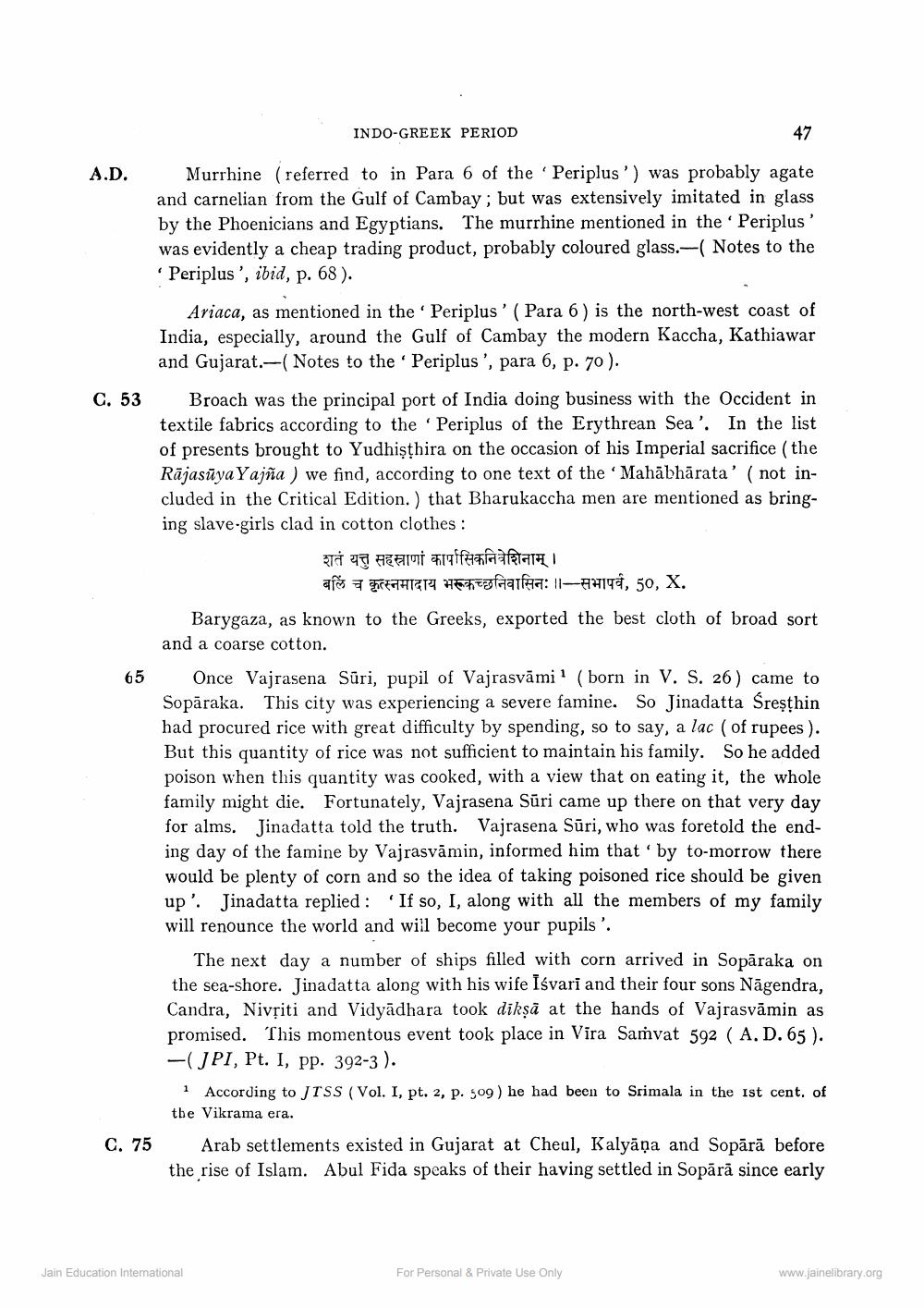________________
INDO-GREEK PERIOD
A.D. Murrhine (referred to in Para 6 of the Periplus') was probably agate
and carnelian from the Gulf of Cambay; but was extensively imitated in glass by the Phoenicians and Egyptians. The murrhine mentioned in the Periplus' was evidently a cheap trading product, probably coloured glass.-( Notes to the 'Periplus', ibid, p. 68).
Ariaca, as mentioned in the Periplus ' (Para 6 ) is the north-west coast of India, especially, around the Gulf of Cambay the modern Kaccha, Kathiawar
and Gujarat.-(Notes to the Periplus', para 6, p. 70 ). C. 53 Broach was the principal port of India doing business with the Occident in
textile fabrics according to the Periplus of the Erythrean Sea'. In the list of presents brought to Yudhisthira on the occasion of his Imperial sacrifice (the Rājasūya Yajña ) we find, according to one text of the Mahābhārata' (not included in the Critical Edition.) that Bharukaccha men are mentioned as bringing slave-girls clad in cotton clothes :
शतं यत्तु सहस्राणां कासिकनिवेशिनाम् ।
afs ETHICTY Hanafaalfaa: 11-4416, 50, X. Barygaza, as known to the Greeks, exported the best cloth of broad sort and a coarse cotton.
Once Vajrasena Sūri, pupil of Vajrasvāmi? (born in V. S. 26) came to Sopāraka. This city was experiencing a severe famine. So Jinadatta Sreşthin had procured rice with great difficulty by spending, so to say, a lac (of rupees). But this quantity of rice was not sufficient to maintain his family. So he added poison when this quantity was cooked, with a view that on eating it, the whole family might die. Fortunately, Vajrasena Sūri came up there on that very day for alms. Jinadatta told the truth. Vajrasena Sūri, who was foretold the ending day of the famine by Vajrasvāmin, informed him that by to-morrow there would be plenty of corn and so the idea of taking poisoned rice should be given up'. Jinadatta replied: "If so, I, along with all the members of my family will renounce the world and will become your pupils'.
The next day a number of ships filled with corn arrived in Sopāraka on the sea-shore. Jinadatta along with his wife īśvari and their four sons Nāgendra, Candra, Nivsiti and Vidyādhara took dikşā at the hands of Vajrasvāmin as promised. This momentous event took place in Vira Samvat 592 (A.D.65 ). --( JPI, Pt. I, pp. 392-3).
1 According to JISS (Vol. I, pt, 2, p. 509 ) he had been to Srimala in the 1st cent. of
tbe Vikrama era. C. 75 Arab settlements existed in Gujarat at Cheul, Kalyāṇa and Sopārā before
the rise of Islam. Abul Fida speaks of their having settled in Sopārā since early
Jain Education Intemational
For Personal & Private Use Only
www.jainelibrary.org




